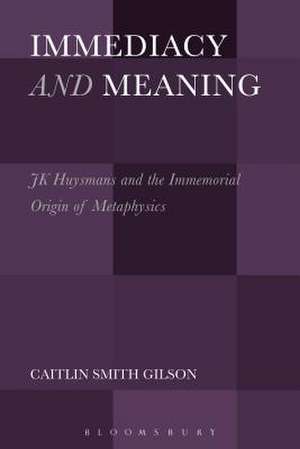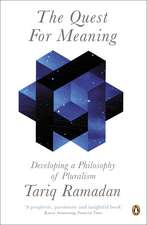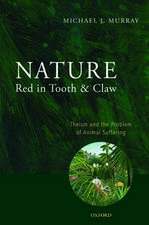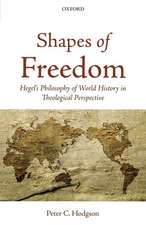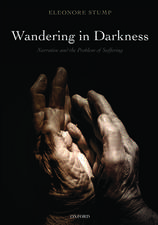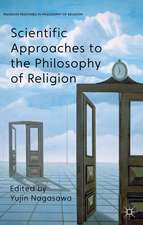Immediacy and Meaning: J. K. Huysmans and the Immemorial Origin of Metaphysics
Autor Dr. Caitlin Smith Gilsonen Limba Engleză Paperback – 22 aug 2018
| Toate formatele și edițiile | Preț | Express |
|---|---|---|
| Paperback (1) | 239.21 lei 6-8 săpt. | |
| Bloomsbury Publishing – 22 aug 2018 | 239.21 lei 6-8 săpt. | |
| Hardback (1) | 772.98 lei 6-8 săpt. | |
| Bloomsbury Publishing – 8 feb 2017 | 772.98 lei 6-8 săpt. |
Preț: 239.21 lei
Preț vechi: 306.51 lei
-22% Nou
Puncte Express: 359
Preț estimativ în valută:
45.77€ • 47.91$ • 38.10£
45.77€ • 47.91$ • 38.10£
Carte tipărită la comandă
Livrare economică 31 martie-14 aprilie
Preluare comenzi: 021 569.72.76
Specificații
ISBN-13: 9781501344671
ISBN-10: 1501344676
Pagini: 328
Ilustrații: 1 b/w illustration
Dimensiuni: 152 x 229 mm
Greutate: 0.44 kg
Ediția:NIPPOD
Editura: Bloomsbury Publishing
Colecția Bloomsbury Academic
Locul publicării:New York, United States
ISBN-10: 1501344676
Pagini: 328
Ilustrații: 1 b/w illustration
Dimensiuni: 152 x 229 mm
Greutate: 0.44 kg
Ediția:NIPPOD
Editura: Bloomsbury Publishing
Colecția Bloomsbury Academic
Locul publicării:New York, United States
Caracteristici
A
unique
selection
of
supporting
thinkers,
especially
and
including,
Meister
Eckhart,
Gregory
Palamas,
Hegel,
Levinas
and
Juan
David
Garcia
Bacca
Notă biografică
Caitlin
Smith
Gilsonis
Associate
Professor
of
Philosophy
at
University
of
the
Holy
Cross,
New
Orleans,
USA.
She
is
the
author
ofMetaphysical
Presuppositions
of
Being-in-the-World(2010)
andThe
Philosophical
Question
of
Christ(2014),
both
published
by
Bloomsbury.
Cuprins
Preface:
Stating
the
Problem
of
MetaphysicsAcknowledgmentsPrologue:
En
Route
to
MemoryPart
I:
St.
Thomas
and
the
Paradox
of
Mediation
and
IntentionalityPart
II:
Re-Approaching
ImmediacyPart
III:
Efficacious
Prayer,
Suffering
and
Self-PresenceEpilogue:
Heaven:
They
Do
Things
Differently
ThereBibliography
Index
Recenzii
The
title
does
not
do
justice
to
this
book's
rich,
eclectic
contents;
it
manages
to
contain
at
once
an
analysis
of
J.
K.
Huysmans's
Durtal
tetralogy,
a
philosophical
inquiry
into
the
nature
of
human
knowledge
and
freedom,
a
theological
exploration
of
prayer
and
suffering,
and
a
florilegium
of
passages
from
various
poets,
mystics,
and
philosophers
in
and
outside
the
Catholic
tradition.
Gilson is without a doubt one of the most remarkable, creative and enticing voices writing today within the tradition of the Continental religious turn of an expressly Christian vision and vintage ... Gilson's unique polyphonic and dramatically literary voice further demands comparison with the beautifully wounded speech of Jean-Louis Chrétien and before him, Max Picard ... A profound metaphysics of prayer which takes us upon a meditative pilgrimage to the Absolute.
Smith Gilson is an emerging Catholic intellectual working at the intersection of philosophy, theology, and literature. This book brings to our philosophical and theological attention the later work of Huysmans and uses it as a platform for insightful reflections on origin, time, and narrative, as well as deep engagement with both the classical and modern philosophical traditions. At its deepest, however, it is a reflection on experience and what exceeds it.
Incorporating an impressive array of works of poetry, prose, philosophy, and theology, this book is no mere work of scholarship. Rather, it is a unique and powerful philosophical meditation upon what it means to be human. It claims that to be human is to be responsive, and thus to bear the responsibility for our knowing, our freedom, and our person. Thus, Gilson proposes that we rethink the notion of the human knower as subject. We are responsive as knowers and agents because we are originally the other to the primal Being and Knower. Thus we are not, as philosophy commonly assumes, primarily the knowing subject, but rather we are a dative of manifestation and we are such because we are primarily datives of love. The work begins by explaining the distortion in our knowledge caused by our necessarily mediated knowing and speaking, and promises the way for us to find our meaning in the unmediated by way of a profound interpretation of memory.Immediacy and Meaningthus claims to retrieve 'the specific anthropology of our own memorial-as-immemorial Other.' The theme of this and her previous three books interpenetrate each other and recur in various and ever interesting degrees of dialogue: God and man, time and eternity, faith and reason, universal and particular, nature and grace, immediacy and meaning, and Truth and Being. To quote another Gilson: 'To introduce others to some important aspects of metaphysical being is no common gift.'
Gilson is without a doubt one of the most remarkable, creative and enticing voices writing today within the tradition of the Continental religious turn of an expressly Christian vision and vintage ... Gilson's unique polyphonic and dramatically literary voice further demands comparison with the beautifully wounded speech of Jean-Louis Chrétien and before him, Max Picard ... A profound metaphysics of prayer which takes us upon a meditative pilgrimage to the Absolute.
Smith Gilson is an emerging Catholic intellectual working at the intersection of philosophy, theology, and literature. This book brings to our philosophical and theological attention the later work of Huysmans and uses it as a platform for insightful reflections on origin, time, and narrative, as well as deep engagement with both the classical and modern philosophical traditions. At its deepest, however, it is a reflection on experience and what exceeds it.
Incorporating an impressive array of works of poetry, prose, philosophy, and theology, this book is no mere work of scholarship. Rather, it is a unique and powerful philosophical meditation upon what it means to be human. It claims that to be human is to be responsive, and thus to bear the responsibility for our knowing, our freedom, and our person. Thus, Gilson proposes that we rethink the notion of the human knower as subject. We are responsive as knowers and agents because we are originally the other to the primal Being and Knower. Thus we are not, as philosophy commonly assumes, primarily the knowing subject, but rather we are a dative of manifestation and we are such because we are primarily datives of love. The work begins by explaining the distortion in our knowledge caused by our necessarily mediated knowing and speaking, and promises the way for us to find our meaning in the unmediated by way of a profound interpretation of memory.Immediacy and Meaningthus claims to retrieve 'the specific anthropology of our own memorial-as-immemorial Other.' The theme of this and her previous three books interpenetrate each other and recur in various and ever interesting degrees of dialogue: God and man, time and eternity, faith and reason, universal and particular, nature and grace, immediacy and meaning, and Truth and Being. To quote another Gilson: 'To introduce others to some important aspects of metaphysical being is no common gift.'
